Related Research Articles

Western Sahara is a disputed territory in North-western Africa. It has a surface area of 272,000 square kilometres (105,000 sq mi). Approximately 30% of the territory is controlled by the Sahrawi Arab Democratic Republic (SADR); the remaining 70% is occupied and administered by neighboring Morocco. It is the most sparsely populated country in Africa and the second most sparsely populated country in the world, mainly consisting of desert flatlands. The population is estimated at 618,600. Nearly 40% of that population lives in Morocco-controlled Laayoune, the largest city of Western Sahara.

All data about demographic information regarding Western Sahara are extremely error-prone, regardless of source. Most countries take censuses every ten years, and some every five in order to stay abreast of change and miscounts; the last count was conducted in 1970, and even that data by colonial Spain is considered unreliable due to large nomadic populations.
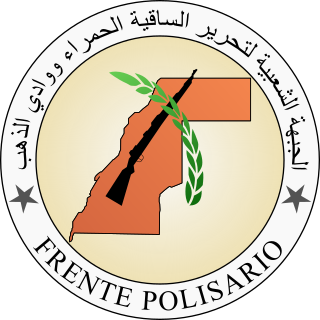
The Polisario Front, Frente Polisario, Frelisario or simply Polisario, is a Sahrawi nationalist liberation movement seeking to establish a Sahrawi Arab Democratic Republic for the Sahrawi people through the means of self-determination and armed resistance in the disputed territory of Western Sahara.
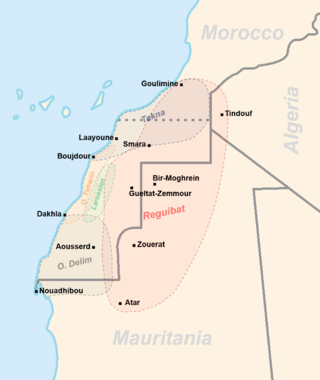
The Sahrawis, or Sahrawi people, are an ethnic group native to the western part of the Sahara desert, which includes the Western Sahara, southern Morocco, much of Mauritania, and along the southwestern border of Algeria. They are of mixed Hassani Arab and Sanhaji Berber descent, as well as West African and other indigenous populations.
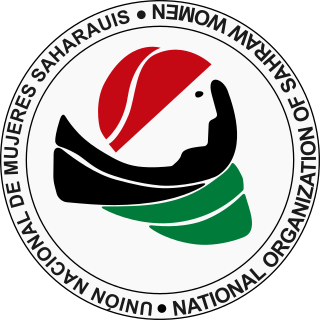
The National Union of Sahrawi Women is the women's wing of the Polisario Front. It was created in 1974, and claims to have 10,000 members, divided between the Sahrawi refugee camps, the Liberated territories, the Moroccan-occupied part of Western Sahara and the Sahrawi diaspora.

Sahrawi Trade Union, also known as UGTSARIO, is the labor organization of the Polisario Front.

Tifariti is an oasis town and the temporary capital of the Sahrawi Arab Democratic Republic, located in north-eastern Western Sahara, east of the Moroccan Berm, 138 km (86 mi) from Smara and 15 km (9 mi) north of the border with Mauritania. It is part of what Polisario Front calls the Liberated Territories and Morocco call the Buffer Zone. It has been the de facto temporary capital of the Sahrawi Arab Democratic Republic since the government moved there in 2008 from Bir Lehlou. It is the headquarters of the 2nd military region of the SADR.

The Sahrawi National Council or Sahrawi Parliament is the legislature of the Sahrawi Arab Democratic Republic. Its structure and competences are guided by the Constitution of the Sahrawi Arab Democratic Republic (SADR). The present speaker since 2020 is Hamma Salama.
Anne Griswold Tyng was an architect and professor. She is best known for having collaborated for 29 years with Louis Kahn at his practice in Philadelphia. She served as a professor at the University of Pennsylvania for 27 years, teaching classes in urban morphology. She was a fellow of the American Institute of Architects and an academician of the National Academy of Design. She is the first woman licensed as an architect by the state of Pennsylvania.
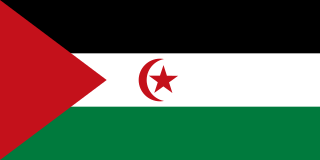
The Sahrawi People's Liberation Army is the army of the Sahrawi Arab Democratic Republic (SADR) and previously served as the armed wing of the Polisario Front prior to the foundation of the Republic. Its commander-in-chief was the Secretary-General of the Polisario, but the army is now also integrated into the SADR government through the SADR Minister of Defense. The SADR and the Polisario Front have no navy or air force. The SPLA's armed units are considered to have a manpower of possibly 20,000–30,000 active soldiers today, but during the war years its strength appears to have increased to 100,000 men. It has a potential manpower of many times that number, since both male and female refugees in the Tindouf camps undergo military training at age 18. Women formed auxiliary units protecting the camps during war years.
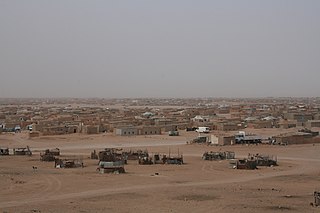
The Sahrawi refugee camps, also known as the Tindouf camps, are a collection of refugee camps set up in the Tindouf Province, Algeria, in 1975–76 for Sahrawi refugees fleeing from Moroccan forces, who advanced through Western Sahara during the Western Sahara War. With most of the original refugees still living in the camps, the situation is among the most protracted in the world.

The following outline is provided as an overview of and topical guide to the Sahrawi Arab Democratic Republic:

Mariem Hassan was a Sahrawi singer and lyricist. She usually sang in Hassaniya, an Arabic variant spoken mostly in Western Sahara and Mauritania, occasionally singing in Saharan Spanish.

The Gdeim Izik protest camp was a protest camp in Western Sahara, established on 9 October 2010 and lasting into November that year, with related incidents occurring in the aftermath of its dismantlement on 8 November. The primary focus of the protests was against "ongoing discrimination, poverty and human rights abuses against local citizens".

The Western Sahara national football team represents Western Sahara (SADR), a disputed territory, in association football. Controlled by the Sahrawi Football Federation, they are members of World Unity Football Alliance for non-FIFA-affiliated nations.

The Sahrawi Arab Democratic Republic, also known as the Sahrawi Republic and Western Sahara, is a partially recognized state, located in the western Maghreb, which claims the non-self-governing territory of Western Sahara, but controls only the easternmost one-fifth of that territory. It is recognized by 46 UN member states and South Ossetia. Between 1884 and 1975, Western Sahara was known as Spanish Sahara, a Spanish colony. The SADR is one of the two African states in which Spanish is a significant language, the other being Equatorial Guinea.
Saharan Spanish is the variety of the Spanish language spoken in Western Sahara and adjacent regions. This variety is heavily influenced by both Spanish cultural links and a strong expatriate community who live in Spain and Hispanic America, particularly Cuba.

Legislative elections were held in the Sahrawi Republic on 8–9 March 2020 to elect 52 of the 53 members of the Sahrawi National Council, the unicameral parliament of the SADR. More than 100,000 Sahrawis were registered to vote, with 145 candidates contesting the elections.

Ebbaba Hameida Hafed is a Sahrawi-Spaniard journalist. She is currently a writer for Radio Televisión Española (RTVE), highlighting her work on migration and women's rights. She has been a member of the board of directors of the Spanish section of Reporters Without Borders since May 2020.
Najla Mohamed-Lamin is a Sahrawi human rights activist and teacher who focuses on women's rights and environment issues. She established the Almasar Library Centre, which educates women and children living in Sahrawi refugee camps about climate change.
References
- ↑ "Kahn, Robin". Katalog der Deutschen Nationalbibliothek. Retrieved 13 March 2023.
- ↑ Schaffner, Ingrid. "Ingrid Schaffner on Robin Kahn". Art Forum. Retrieved 13 March 2023.
- ↑ Kahn, Robin (1995). Time capsule : a concise encyclopedia by women artists. New York: Creative Time in cooperation with SOS Int'l. ISBN 1881616339.
- ↑ Kahn, Robin (2005). The intelligent woman's guide to art : an essay designed to point out the basic things one should look for in order to appraise intelligently and fully appreciate whatever paintings one may see : prepared for distribution to the General Federation of Women. New York: Mis Dias Press. ISBN 978-1933045375.
- ↑ "Robin Kahn: The Intelligent Woman's Guide to Art - ARTBOOK". Distributed Art Publishers, Inc. Retrieved 13 March 2023.
- ↑ Kahn, Robin (2010). Dining in refugee camps : the art of Sahrawi cooking = Cenando en los campamentos de refugiados : un libro de cocina saharaui. Brooklyn, NY: Autonomedia. ISBN 1570272158.
- ↑ "Robin Kahn". The Collective Eye (in German). Retrieved 13 March 2023.
- ↑ "Robin Kahn". Creative Time Reports. Retrieved 13 March 2023.
- ↑ "Robin Kahn". NMWA Library & Research Center. Retrieved 12 March 2023.